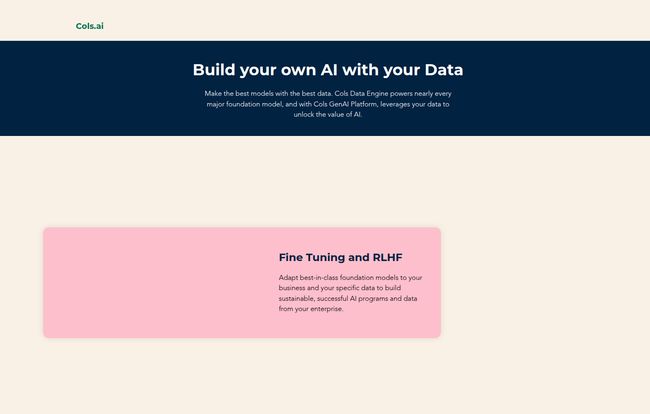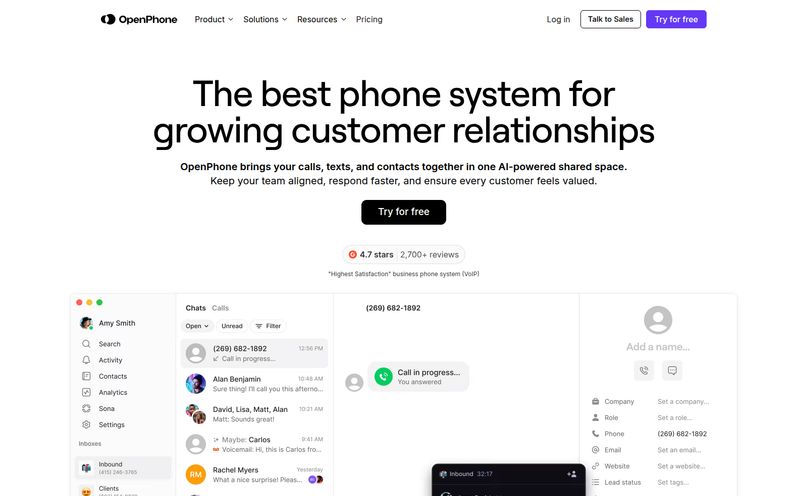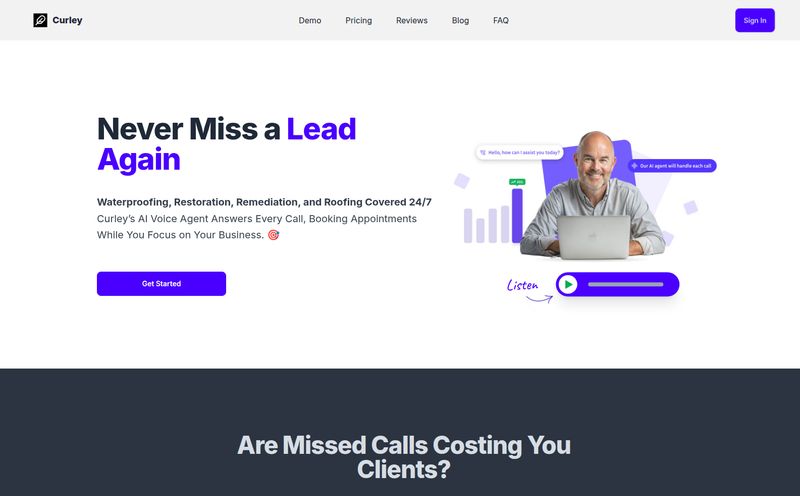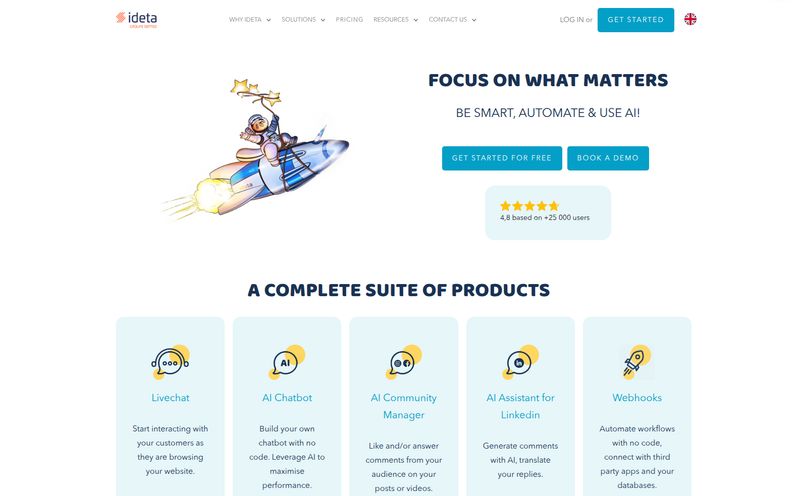We've all been there. Trapped in the automated hellscape of a customer service line, screaming "HUMAN!" into the phone while a cheerful, yet utterly useless, robot voice tells you it doesn't understand your request. It's enough to make you want to throw your phone against a wall. For years, we've been promised the dream of AI assistants that are actually helpful, but the reality has often been... disappointing.
So, when I stumbled upon Cols AI, I was skeptical. Another platform promising to revolutionize customer interactions with AI? Sure. But then I started digging, and my cynicism slowly began to melt away. This might just be different. They're not just selling a bot; they're offering a platform to build a genuinely intelligent, data-driven voice agent for your specific business. And the part that really caught my eye? A response time that's actually fast enough for a real conversation.
So, What Exactly is Cols AI?
Think of Cols AI not as a pre-built robot, but as a high-performance engine and a custom workshop. You get two main things: a blazingly fast AI voice agent and the GenAI platform to make it smart. It's a system designed to handle complex, real-time customer problems over the phone, without that awkward, tell-tale lag that screams "I'm a computer!"
The secret sauce seems to be this dual approach. On one hand, you have the front-end voice assistant, the part that actually talks to your customers. On the other, you have the back-end data engine, which is where the real magic happens. This engine is what allows the AI to learn from your company's data, not just generic internet text.
The Sub-1000ms Latency: Why Speed is Everything
Cols AI makes a big deal about their "sub-1000ms latency." And they should. For those of us who aren't network engineers, that means the delay between the customer speaking and the AI responding is less than one second. This is the golden threshold. Anything slower feels clunky and unnatural. It's the difference between a fluid conversation and a frustrating game of telephone with a very slow partner.
I've seen so many AI demos that look great on paper but fall apart in practice because of lag. By tackling this head-on, Cols AI is addressing one of the biggest user experience hurdles in voice AI. It means customers can interrupt, ask follow-up questions, and have a conversation that flows, rather than a rigid, turn-based interrogation.

Visit Cols AI
"Build Your Own AI" is More Than a Catchphrase
This is the part where my inner SEO and data geek gets really excited. The platform's promise to "leverage your data to create the value of AI" is the core of their entire offering. Anyone can plug into a generic AI model these days, but the results are, well, generic. True differentiation comes from customisation.
Your Data, Your AI's Brain
Cols AI's Data Engine is designed to integrate all sorts of enterprise data sources. We're talking about structured data (like the neat rows and columns in your CRM or product database) and unstructured data (the messy stuff, like call transcripts, support emails, and knowledge base articles). By feeding all of this into the system, you're not just getting an AI that can answer questions; you're building an AI that understands the specific context of your business. It knows your return policy, your product specs, and maybe even the weird edge cases that your senior support staff have memorized.
Fine-Tuning, RLHF, and Other Fancy Terms
The platform supports Fine-Tuning and RLHF (Reinforcement Learning from Human Feedback). Don't let the jargon scare you. Think of it like this: Fine-tuning is like sending a brilliant, newly-hired employee to a training program that's 100% focused on your company's processes. RLHF is the on-the-job training that follows, where you give the AI feedback—"good job on that answer," or "handle this type of question differently next time"—to continuously improve its performance. It's a powerful loop for making the AI sharper and more aligned with your brand's voice.
Freedom from Model Lock-In
Another huge plus? Cols AI supports all major foundation models. This is huge. It means you're not locked into using OpenAI's GPT, Google's Gemini, or any single provider. You can choose the best model for your specific needs, or even switch if a better one comes along. This future-proofs your investment and gives you a level of flexibility that many competing platforms just don't offer.
Let's Talk About the Price Tag
For a while, pricing information on Cols AI was a bit of a mystery, which is always a red flag for me. You had to book a demo to get any numbers. But it looks like they've become more transparent, and I am here for it. They've opted for a straightforward pay-as-you-go model, priced per minute.
Here’s a quick breakdown based on their site:
| Plan | Price Per Minute | Key Features |
|---|---|---|
| Basic | $0.05 | Connect any LLM, Multiple Languages, Email Support |
| Pro | $0.06 | Everything in Basic + Fine Tuning, Custom Workflows, Tech Integration, Live Human Transfer, Web/Mobile Support |
My take? At five or six cents a minute, this is incredibly competitive. A human call center agent can cost anywhere from $0.45 to over $1.00 per minute, depending on the location and skill. The potential for cost savings is massive, especially for the Pro plan which includes that all-important "Live Human Transfer" for when the AI does get stuck. Its a small price to pay for a smooth customer experience.
Who Is This For? And Who Should Probably Wait?
Cols AI is not a magic wand you wave over your bad customer service. It’s a power tool. It seems perfectly suited for mid-to-large-sized businesses that have a high volume of customer interactions and a wealth of internal data they can use for training. Think e-commerce, telecommunications, insurance, or any industry where customers call with complex, multi-step problems.
Who should pass? If you're a solopreneur or a very small business without a significant amount of data or the technical resources to manage the integration, this might be overkill. The value of Cols AI is directly tied to the data you feed it. No data, no magic. It does require some effort on the integration side, so you need to be prepared for that initial setup project.
My Final, Honest-to-Goodness Thoughts
I'm cautiously optimistic. I’ve been in the SEO and traffic generation game for a long time, and I've seen countless tools that promise the world and deliver a pamphlet. Cols AI feels different. It feels… substantial.
The combination of insane speed, a data-first approach, and model-agnostic flexibility is a potent one. They seem to understand the real problems holding back voice AI—latency and lack of specific knowledge—and have built a platform to solve them directly.
The downside, if you can call it that, is that it's a professional-grade tool that requires a commitment. You have to be willing to do the work of integrating your data sources to unlock its full potential. But for the businesses that are ready to make that commitment? I think Cols AI could be less of a simple cost-saving tool and more of a genuine competitive advantage. It's a chance to build a customer experience that isn't just tolerable, but maybe, just maybe, actually delightful.
Frequently Asked Questions about Cols AI
What is Cols AI in simple terms?
Cols AI is a platform that lets you build your own super-fast, super-smart AI voice assistant for customer service. It uses your company's own data to give smart, relevant answers and can have natural, low-lag conversations with customers over the phone.
How much does Cols AI cost?
Cols AI uses a pay-as-you-go model. The Basic plan costs $0.05 per minute, and the Pro plan, which includes features like fine-tuning and live human transfer, costs $0.06 per minute.
Can the AI transfer a call to a person?
Yes! The Pro plan explicitly includes a "Live Human Transfer" feature, allowing the AI to seamlessly pass complex or sensitive calls to a human agent without frustrating the customer.
Do I need to be a data scientist to use it?
While you don't necessarily need to be a PhD-level data scientist, having some technical resources will be beneficial. The platform is designed for integration with your existing tech stack and data sources, so some expertise in that area is required for the initial setup. It's not a simple plug-and-play solution for non-technical users.
Why is the low latency so important?
The sub-1000ms (less than one second) latency is crucial because it allows for a natural, flowing conversation. It eliminates the awkward pauses that make most AI interactions feel robotic and frustrating, leading to a much better customer experience.
Can I use my existing CRM with Cols AI?
The platform is built around data integration. While their site doesn't list specific CRMs, the Pro plan's "Integration with your tech" and the Data Engine's purpose strongly suggest that it's designed to connect with systems like CRMs, probably through APIs, to pull customer data and push information back.
The Bottom Line
After years of underwhelming AI voice bots, Cols AI feels like a breath of fresh air. It’s ambitious, technically sound, and focused on solving the right problems. It's not a solution for everyone, and it requires real effort to get going. But for companies drowning in support calls and ready to invest in a next-generation solution, Cols AI might just be the tool that finally delivers on the long-held promise of truly intelligent voice automation.



